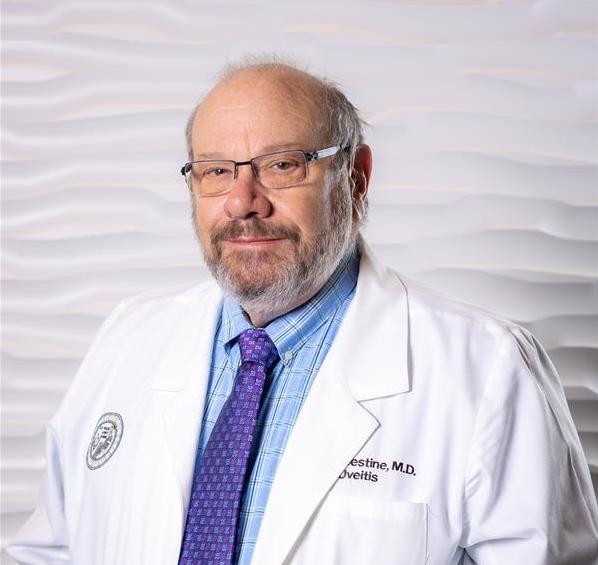(1/8)
(2/8)
(3/8)
(4/8)
(5/8)
(6/8)
(7/8)
(8/8)
Vision Science Research
Welcome to the CU Anschutz Department of Ophthalmology’s research site.
Vision science research in the CU Anschutz Department of Ophthalmology is conducted by a strong group of primary and affiliated faculty who direct high-impact basic, translational, and clinical research programs. These programs span many topics in ophthalmology, including retinal development and physiology, mechanisms of ocular disease, cell-based therapeutics, ocular epidemiology, artificial intelligence, systematic review, clinical trials, and uveitis. Scientists work together closely in laboratories across CU Anschutz to deliver promising new findings.
Please explore our site to learn more about the research being performed in each laboratory. If you would like to support our research, please visit our giving page to learn more about the process. Every bit of support makes a difference.
Explore our research faculty:
| Lab Name | ||
Dr. Abraham focuses on vision loss and its impact on aging outcomes with current work in community vision screening for aging adults, particularly those aging with HIV. |
The Bennett laboratory is interested in understanding the pathogenesis of inflammatory disorders of the central nervous system and optic nerve: multiple sclerosis, neuromyelitis optica, and myelin oligodendrocyte glycoprotein antibody-associated disorder. |
The Brzezinski Lab studies the genetic mechanisms that control mouse and human retinal development. |
|
Dr. Chauhan's research focuses on developing novel formulations and devices for delivering ophthalmic drugs and mechanistic pharmacokinetic models. |
Development of novel 3D retinal tissues derived from human induced pluripotent stem cells and their use as platforms for developing new treatments for blinding diseases. |
The Denman laboratory studies how neurons and neural interactions - within neocortical visual areas and distributed across the brain- generate successful visual perceptions using quantitative psychophysics, in vivo high-density electrophysiology, in vivo imaging, circuit tracing, and computational methods. |
The long-term goal of the research carried out by Dr. Flores-Bellver's team is to contribute to a better understanding of the early events involved in early Age-related Macular Degeneration (AMD), including drusen biogenesis. |
The Hassman Lab aims to identify therapeutic targets for uveitis, or ocular inflammatory disease, by combining genomic analysis of patients with in vitro and in vivo models to dissect pathophysiologic mechanisms. |
Jayashree Kalpathy-Cramer, PhD The Division of Artificial Intelligence in Ophthalmology focuses on developing, evaluating, and deploying AI solutions in healthcare with a focus on ophthalmology. |
|
Uday Kompella, PhD, FARVO, FAAPS The Kompella laboratory focuses on drug and gene delivery research, with a focus on formulations, nanomedicines, and pharmacokinetics. |
Our group is interested in the development of cell-interactive biopolymer systems that will allow the study of cells’ interactions with their microenvironment. These systems can be used for tissue regeneration and the discovery of therapeutics, including for glaucoma. |
|
The goal of the Li Lab's research is to develop, evaluate, and disseminate methods for comparing healthcare interventions and to provide trustworthy evidence for decision making. She directs the NEI-funded Cochrane Eyes and Vision US Project. |
Dr. Liu is interested in leveraging electronic health record data to inform clinical practice and policies with a specific focus on dry eye. |
Dr. Lynch investigates the role of systemic inflammatory biomarkers in age-related macular degeneration along with the links between maternal complications of pregnancy and the development of retinopathy of prematurity. |
|
Dr. Nagaraj's laboratory investigates mechanisms and develops therapeutic interventions for secondary cataracts, and neurovascular degeneration in glaucoma and diabetes. |
|
Dr. Nam's research primarily focuses on developing neuroprotective therapeutics for retinal ganglion cells (RCGs) in animal models of eye diseases, with a particular emphasis on glaucoma and traumatic optic neuropathies. |
Dr. Palestine investigates clinical immune mechanism in a wide variety of ocular diseases including uveitis, scleritis, ocular pemphigoid and age-related macular degeneration with the goal of diagnosing and modulating inflammatory processes which cause visual loss. He is also involved in the CellSight and Whole Eye Transplant research programs on the Anschutz campus. |
|
Dr. Patnaik focuses on age-related macular degeneration, retinopathy of prematurity, cataract and glaucoma surgeries, and other ophthalmic diseases. She is especially interested in assessing disparities in ocular disease. |
Dr. Pelak’s research focuses on the processing of vision in the brain in association with aging and with neurodegenerative diseases such as Alzheimer’s disease. |
Dr. Petrash is a retired professor who continues to collaborate to study cataract mechanisms and novel therapies to reverse lens opacification and prevent the post-surgical development of capsule opacification. |
Dr. Poleg-Polsky uses electrophysiology, 2-photon imaging, and machine learning to understand visual computations in the rodent retina. |
Dr. Qureshi is interested in the methods used to investigate the harms of interventions at different levels of evidence, from adverse events collected and reported in clinical trials to the synthesis of harms in systematic reviews. |
|
The Vergara Lab uses stem cell technologies to model developmental abnormalities and degenerative diseases of the human retina, with the goal of advancing novel treatments to prevent vision loss or blindness. |
|
Dr. Washington's research interests include a comprehensive approach to research in whole eye transplantation and improving peripheral and central nerve regeneration after injury and in the setting of vascularized composite allotransplantation. |
|
|
|
Scientific and Training Environment
The CU Anschutz Department of Ophthalmology provides an excellent training environment for postdocs, graduate students, and undergraduates. Our research faculty are affiliated with several graduate training programs, including Biomedical Sciences, Cell Biology, Stem Cells and Development, Medical Scientist, Neuroscience, along with programs in Public Health. Graduate students in these rigorous training programs can perform their thesis research with members of our faculty. Many of our faculty mentor undergraduate trainees. This includes mentoring students who participate in the Gates Summer Internship Program every year in addition to other programs on campus.
The department also hosts a variety of monthly meetings to stimulate research in the vision sciences. During the academic year, we host a Journal Club in which our graduate students and postdoctoral scientists lead discussions of high impact publications in leading journals. We also host a Vision Science Seminar Series featuring internationally-prominent speakers from the vision research community. Both of these events are open to the campus community.

































